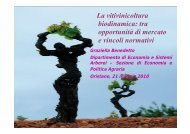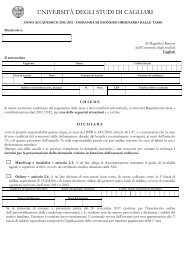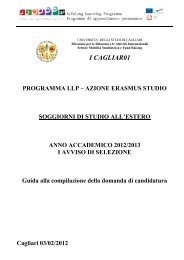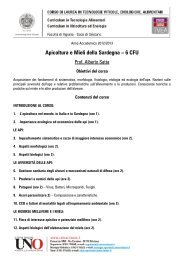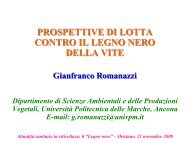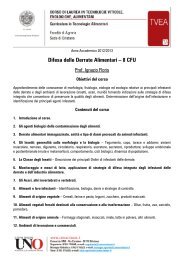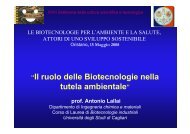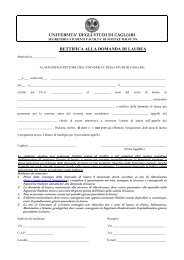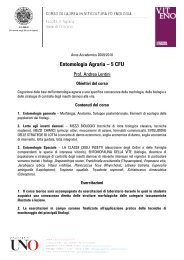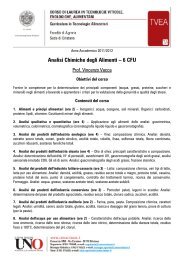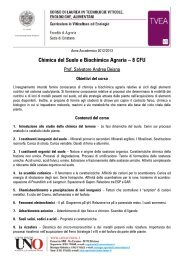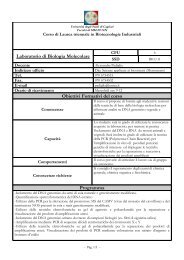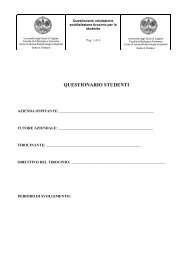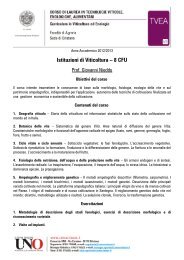Marketing Turistico - Consorzio UNO
Marketing Turistico - Consorzio UNO
Marketing Turistico - Consorzio UNO
You also want an ePaper? Increase the reach of your titles
YUMPU automatically turns print PDFs into web optimized ePapers that Google loves.
Università degli Studi di Cagliari<br />
Facoltà di Scienze Economiche, Giuridiche e Politiche<br />
A.A. 2012/2013<br />
Denominazione insegnamento: MARKETING TURISTICO<br />
Denominazione insegnamento in inglese: TOURISTIC MARKETING<br />
Settore scientifico-disciplinare Insegnamento: SECS-P/08<br />
Corso di studio: Economia e Gestione dei Servizi Turistici<br />
Classe di studio: L-18<br />
Anno di corso nel quale viene impartito l’insegnamento: 3 Semestre: 1<br />
Crediti assegnati: 9<br />
Lezioni frontali 1 (n° ore): 54<br />
Docente titolare1: GIUSEPPE MELIS<br />
Dipartimento: SCIENZE ECONOMICHE ED AZIENDALI<br />
Settore scientifico-disciplinare Docente: SECS-P/08<br />
Fascia: Seconda Fascia<br />
Tipologia di incarico: Tempo Pieno<br />
Docente titolare 2:DANIELA PETTINAO<br />
Dipartimento: SCIENZE ECONOMICHE ED AZIENDALI<br />
Settore scientifico-disciplinare Docente: SECS-P/08<br />
Fascia: Ricercatore a Tempo Indeterminato<br />
Tipologia di incarico: Tempo Pieno<br />
Prerequisiti (max 3500 caratteri):<br />
Ancorchè non ci siano propedeuticità amministrative, sarebbe auspicabile che la frequenza del corso di marketing<br />
avvenga dopo che lo studente ha frequentato e sostenuto gli esami di Economia del turismo, Economia aziendale,<br />
Ragioneria, Economia e gestione delle imprese turistiche, Legislazione del turismo.<br />
Obiettivi formativi dell’insegnamento (max 3800 caratteri):<br />
imprese e nelle organizzazioni turistiche ’ z zz<br />
turisti e ottenere valore dagli stessi. I q ’ b z<br />
b h ’ b turisti z<br />
z b h iguardanti le principali leve<br />
del marketing mix a cominciare dalla concezione di prodotti turistici.<br />
z z h<br />
piano di marketing e di progettare prodotti turistici con caratteristiche conformi alle richieste della domanda<br />
turistica.<br />
1 1 CFU è pari a 6 ore di lezione frontale.<br />
Pagina 1 di 3
Università degli Studi di Cagliari<br />
Facoltà di Scienze Economiche, Giuridiche e Politiche<br />
A.A. 2012/2013<br />
Contenuti dell’insegnamento (max 3800 caratteri):<br />
1. Il turismo ed il sistema turistico<br />
2. Il marketing del turismo<br />
3. I servizi di marketing del turismo<br />
4. I ’ q<br />
5. Il ruolo del marketing nella pianificazione strategica<br />
6. ’ b<br />
7. Sistemi informativi di marketing e ricerche di marketing<br />
8. I ’ q zz z<br />
9. La segmentazione, la scelta dei mercati obiettivo e il posizionamento<br />
10. I x ’ :<br />
11. La definizione del prezzo del prodotto e le relative politiche<br />
12. I canali distributivi<br />
13. La promozione dei prodotti<br />
14. <strong>Marketing</strong> diretto e marketing on line<br />
15. Il marketing della destinazione turistica<br />
16. Il piano di marketing<br />
17. Casi a scelta di prodotti turistici con particolare riferimento alla realtà della Sardegna<br />
Metodi didattici (max 3800 caratteri):<br />
• Lezioni frontali<br />
• Casi aziendali ed esercitazioni<br />
• Gruppi di studio<br />
• Testimonianze di operatori turistici pubblici e privati<br />
Modalità di verifica dell’apprendimento (max 3800 caratteri):<br />
’ . D svolgimento delle lezioni, possono tenersi<br />
verifiche ed esercitazioni che costituiscono una base preliminare per la valutazione complessiva dello studente<br />
Testi di riferimento (max 3800 caratteri):<br />
I contenuti del programma come sopra indicato si ritrovano nei seguenti testi:<br />
• Casarin Francesco, Il marketing dei prodotti turistici. Specificità e varietà, volume primo, Giappichelli, Torino,<br />
2007, Capitolo 1.<br />
• Kotler Philip, Bowen Johon, Makens James, <strong>Marketing</strong> del turismo, quinta edizione, 2010.<br />
• Ogni studente dovrà conoscere anche due capitoli a scelta del libro Casarin Francesco (a cura di), Il marketing dei<br />
prodotti turistici, Specificità e varietà, volume secondo, Giappichelli, Torino, 2007.<br />
Altre informazioni (max 3800 caratteri):<br />
La frequenza delle lezioni non è un obbligo ma è una occasione per apprendere in gruppo. Per questa ragione essa<br />
non dovrebbe essere una opzione residuale nella programmazione delle attività dello studente, ma il principale<br />
impegno cui subordinare le altre scelte quotidiane, anche di chi lavora. Il nostro compito come docenti, è quello di<br />
far si che l'esperieza dell'apprendimento in aula sia efficace e piacevole.<br />
English version<br />
Prerequisites (max 3500 characters):<br />
In spite there are not formal prerequisites, it would be better that students attend the marketing course after the<br />
following list of exams: Buisnees economics (Economia aziendale), Tourism Economics (Economia del turismo),<br />
Pagina 2 di 3
Università degli Studi di Cagliari<br />
Facoltà di Scienze Economiche, Giuridiche e Politiche<br />
A.A. 2012/2013<br />
Business management (Economia e gestione delle imprese), Accountancy (Ragioneria) and Touristic jurisdiction<br />
(Legislazione del turismo)<br />
Objectives (max 3800 characters):<br />
A the end of the course students will know the difference between srategic marketing and operational marketing.<br />
Then, they will be able to manage te makreting knowledge (concepts, tools, etc.) so that they will take decisions to<br />
create value for tourists through to demand analysis, segmentation, targeting and positioning. Hence they will be<br />
able to answer at the questions on products, prices, promotion and placement in tourism and hospitality.<br />
Content (max 3800 characters):<br />
1. What is tourism<br />
2. <strong>Marketing</strong> in tourism and hospitality<br />
3. <strong>Marketing</strong> services in tourism<br />
4. The tourist's behaviour in its choices of purchase and consume<br />
5. <strong>Marketing</strong> in strategic planning<br />
6. <strong>Marketing</strong> contest<br />
7. Information <strong>Marketing</strong> System (MIS) and <strong>Marketing</strong> researches<br />
8. The importance to analyse markets, clients, customers and their behaviour<br />
9. Segmentation, Targeting and Positioning<br />
10. <strong>Marketing</strong> mix in tourism and hospitality: the turistic product<br />
11. Pricing decisions<br />
12. Distribution channel decisions<br />
13. Promotion<br />
14. Direct <strong>Marketing</strong> and Web <strong>Marketing</strong><br />
15. Destination <strong>Marketing</strong><br />
16. <strong>Marketing</strong> plan<br />
17. Case stories<br />
Teaching Methodology (max 3800 characters):<br />
Lecturers, case stories, seminars with entrepreuners, managers and professionals, exercices at home (only for<br />
students who decide to attend the lessons)<br />
Examination / Assessment (max 3800 characters):<br />
The final proof will consist in an oral exam on the contents of the programme (in English or Italian)<br />
Bibliography (max 3800 characters):<br />
• C F I . S G h T<br />
2007, Capitolo 1.<br />
• K Ph Bowen Johon, Makens James, <strong>Marketing</strong> del turismo, quinta edizione, 2010.<br />
Foreign students that wish to take the exam in English may prepare the exam using the text<br />
McCabe Scott, <strong>Marketing</strong> Communications in Tourism & Hospitality, BH of Elsevier, 2009.<br />
Further information (max 3800 characters):<br />
Attending lessons is not a compulsory activity but an opportunity to learn in group. This is the reason why it should<br />
not be a remaining option of the students' decision process, but the main commitment of its daily activities. Our<br />
task, as a teachers, is to make efficient and enjoible the learning experience of students.<br />
Pagina 3 di 3



